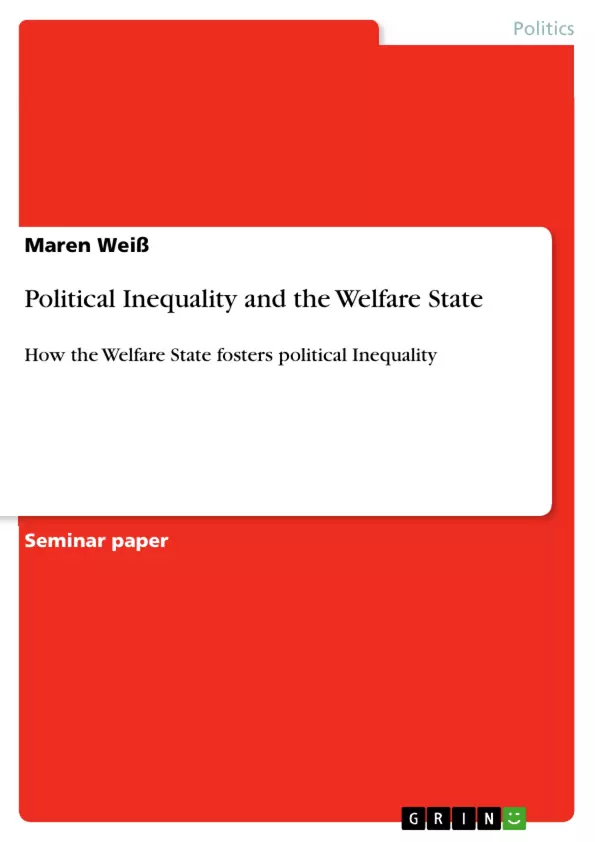In this research paper the relationship between social and political inequality, caused by the welfare state, is explored in detail. On the whole, it deals with the impact of the welfare state on the growing political inequality, which is assumed to result out of a produced increasing social inequality. The theory contains four basic arguments, which partly already exist and are transferred from the dimension of social equality to the political equality dimension.
These theoretical assumptions rely on the counterproductive effects of social policies, different welfare regime types, unequal resource distribution and low internal efficacy. The hypotheses, dealing with one theoretical argument each, could be tested through a combination of the International Social Survey Program (ISSP) database and further additional empirical extensions. This research paper fills the gap within the existing literature explaining how the welfare state can foster political inequality.
Inhaltsverzeichnis (Table of Contents)
- Abstract
- 1. Introduction & Research Question
- 2. Literature Review & the State of the Art
- 3. Theory
- 4. Hypotheses
- 5. Research Design
- 5.1 Data & Methods
- 5.2 Operationalization
- 6. Conclusion & Discussion
- 7. References
Zielsetzung und Themenschwerpunkte (Objectives and Key Themes)
This research paper explores the relationship between social and political inequality, caused by the welfare state. It examines the impact of the welfare state on growing political inequality, which is assumed to result from increasing social inequality. The paper aims to bridge the gap in the existing literature by explaining how the welfare state can foster political inequality.
- Counterproductive effects of social policies
- Different welfare regime types and their impact on equality
- Unequal resource distribution and its influence on political participation
- The role of internal efficacy in political engagement
- The paradox of redistribution and its implications for political equality
Zusammenfassung der Kapitel (Chapter Summaries)
- Abstract: This section provides a brief overview of the research paper's main focus, methodology, and key findings.
- 1. Introduction & Research Question: This chapter introduces the research question: "To what extent is political inequality fostered by the welfare state?" It highlights the growing gap between the rich and poor and the paradoxical role of the welfare state in addressing this issue.
- 2. Literature Review & the State of the Art: This chapter reviews existing literature on the relationship between the welfare state and social/political inequality, identifying a gap in research on the specific impact of welfare state programs on political equality. It introduces key concepts like the "paradox of redistribution" and the inconsistency of social policies.
Schlüsselwörter (Keywords)
The core concepts and themes of this research paper include political inequality, welfare state, social inequality, paradox of redistribution, counter-productivity, resource distribution, internal efficacy, welfare regime types, and the International Social Survey Program (ISSP).
Frequently Asked Questions
How does the welfare state foster political inequality?
The research suggests that counterproductive social policies and unequal resource distribution can lead to a gap in political participation and internal efficacy among different social groups.
What is the "paradox of redistribution"?
It refers to the phenomenon where welfare systems designed to reduce inequality may inadvertently create new forms of social or political disparities.
What role does "internal efficacy" play in this study?
Internal efficacy refers to a citizen's belief that they can understand and influence politics. Low efficacy is linked to higher political inequality.
Which data sources were used for the research?
The study combined the International Social Survey Program (ISSP) database with further empirical extensions to test its hypotheses.
How do welfare regime types affect political equality?
The theory argues that different structures of welfare states (regimes) distribute resources and power differently, impacting the level of political engagement among the population.
- Arbeit zitieren
- Maren Weiß (Autor:in), 2018, Political Inequality and the Welfare State, München, GRIN Verlag, https://www.grin.com/document/489707



